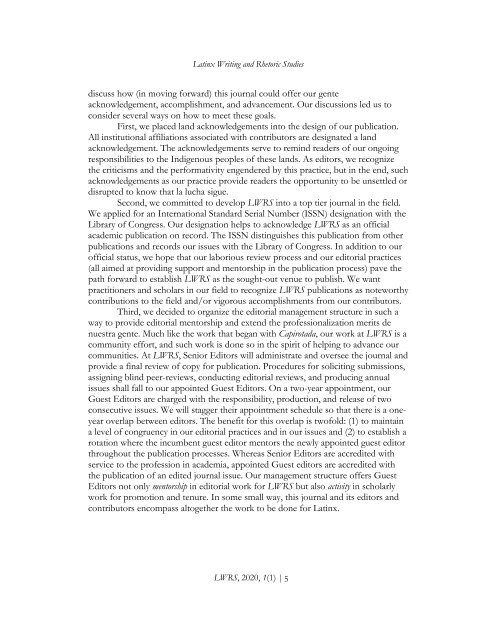LWRS June 2020 Volume 1, Issue 1
Inaugural Issue co-edited by Yndalecio Isaac Hinojosa and Isabel Baca
Inaugural Issue co-edited by Yndalecio Isaac Hinojosa and Isabel Baca
Create successful ePaper yourself
Turn your PDF publications into a flip-book with our unique Google optimized e-Paper software.
Latinx Writing and Rhetoric Studies<br />
discuss how (in moving forward) this journal could offer our gente<br />
acknowledgement, accomplishment, and advancement. Our discussions led us to<br />
consider several ways on how to meet these goals.<br />
First, we placed land acknowledgements into the design of our publication.<br />
All institutional affiliations associated with contributors are designated a land<br />
acknowledgement. The acknowledgements serve to remind readers of our ongoing<br />
responsibilities to the Indigenous peoples of these lands. As editors, we recognize<br />
the criticisms and the performativity engendered by this practice, but in the end, such<br />
acknowledgements as our practice provide readers the opportunity to be unsettled or<br />
disrupted to know that la lucha sigue.<br />
Second, we committed to develop <strong>LWRS</strong> into a top tier journal in the field.<br />
We applied for an International Standard Serial Number (ISSN) designation with the<br />
Library of Congress. Our designation helps to acknowledge <strong>LWRS</strong> as an official<br />
academic publication on record. The ISSN distinguishes this publication from other<br />
publications and records our issues with the Library of Congress. In addition to our<br />
official status, we hope that our laborious review process and our editorial practices<br />
(all aimed at providing support and mentorship in the publication process) pave the<br />
path forward to establish <strong>LWRS</strong> as the sought-out venue to publish. We want<br />
practitioners and scholars in our field to recognize <strong>LWRS</strong> publications as noteworthy<br />
contributions to the field and/or vigorous accomplishments from our contributors.<br />
Third, we decided to organize the editorial management structure in such a<br />
way to provide editorial mentorship and extend the professionalization merits de<br />
nuestra gente. Much like the work that began with Capirotada, our work at <strong>LWRS</strong> is a<br />
community effort, and such work is done so in the spirit of helping to advance our<br />
communities. At <strong>LWRS</strong>, Senior Editors will administrate and oversee the journal and<br />
provide a final review of copy for publication. Procedures for soliciting submissions,<br />
assigning blind peer-reviews, conducting editorial reviews, and producing annual<br />
issues shall fall to our appointed Guest Editors. On a two-year appointment, our<br />
Guest Editors are charged with the responsibility, production, and release of two<br />
consecutive issues. We will stagger their appointment schedule so that there is a oneyear<br />
overlap between editors. The benefit for this overlap is twofold: (1) to maintain<br />
a level of congruency in our editorial practices and in our issues and (2) to establish a<br />
rotation where the incumbent guest editor mentors the newly appointed guest editor<br />
throughout the publication processes. Whereas Senior Editors are accredited with<br />
service to the profession in academia, appointed Guest editors are accredited with<br />
the publication of an edited journal issue. Our management structure offers Guest<br />
Editors not only mentorship in editorial work for <strong>LWRS</strong> but also activity in scholarly<br />
work for promotion and tenure. In some small way, this journal and its editors and<br />
contributors encompass altogether the work to be done for Latinx.<br />
<strong>LWRS</strong>, <strong>2020</strong>, 1(1) | 5





